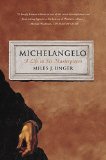Summary | Excerpt | Reviews | Beyond the Book | Readalikes | Genres & Themes | Author Bio

Critics' Opinion:
Readers' Opinion:
First Published:
Jul 2014, 448 pages
Paperback:
Jul 2015, 448 pages
 Book Reviewed by:
Book Reviewed by:
Suzanne Reeder
Buy This Book
If Lorenzo's motive for establishing a training ground for young sculptors is straightforward, less clear is the exact nature of the school. Even more obscure is what Michelangelo actually learned there. Bertoldo di Giovanni, an accomplished modeler in bronze who had been a pupil of the great Donatello himself, was apparently hired to provide instruction, but it is unlikely that students there received anything like the rigorous training available at Ghirlandaio's shop. By 1489, when Michelangelo first began to attend sessions at Lorenzo's garden, Bertoldo was a sickly old man (he would die two years later), and he worked almost exclusively in bronze, a medium Michelangelo famously despised.
It is probable that at first Michelangelo divided his time between Ghirlandaio's studio and Lorenzo's sculpture garden. Sketching alongside him among the cypresses and laurel hedges were not only his friend from Ghirlandaio's atelier, Francesco Granacci, but also Giovanfrancesco Rustici (the man who would later realize some of Leonardo's sculptural designs), Giuliano Bugiardini, and Pietro Torrigiano. It was in Lorenzo's garden that Michelangelo made his first sculpture, a head of a faun based on an ancient model in Lorenzo's collection. As Condivi tells the story, the sculpture, though little more than a student exercise, transformed Michelangelo's life:
One day, [Michelangelo] was examining among these works the Head of a Faun, already old in appearance, with a long beard and laughing countenance, though the mouth, on account of its antiquity, could hardly be distinguished or recognized for what it was; and, as he liked it inordinately, he decided to copy it in marble. He set about copying the Faun with such care and study that in a few days he had perfected it, supplying from his imagination all that was lacking in the ancient work, that is, the open mouth as of a man laughing, so that the hollow of the mouth and all the teeth could be seen. In the midst of this, the Magnificent, coming to see what point his works had reached, found the boy engaged in polishing the head and, approaching quite near, he was much amazed, considering first the excellence and then the boy's age; and although he did praise the work, nonetheless he joked with him as with a child and said, "Oh, you have made this Faun old and left him all his teeth. Don't you know that old men of that age are always missing a few?"
To Michelangelo it seemed a thousand years before the Magnificent went away so that he could correct the mistake; and, when he was alone, he removed an upper tooth from his old man, drilling the gum as if it had come out with the root, and the following day he awaited the Magnificent with eager longing. When he had come and noted the boy's goodness and simplicity, he laughed at him very much; but then, when he weighed in his mind the perfection of the thing and the age of the boy, he, who was the father of all virtù, resolved to help and encourage such great genius and to take him into his household; and, learning from him whose son he was, he said, "Inform your father that I would like to speak to him."
At first, Condivi tells us, Lodovico was appalled, "lamenting that his son would be led astray . . . moreover, that he would never suffer his son to become a stonemason." As much as he loathed the idea of his son becoming a common artisan, he was equally upset by the thought (and not without reason) that Michelangelo would be corrupted by the loose morals of that famously libertine crowd. But in the end he could not resist a summons from the uncrowned ruler of Florence. The meeting between the proud but poor Lodovico Buonarroti di Simone and Il Magnifico in the intimidating surroundings of the Medici Palace has a slightly comic tinge. When Lorenzo asked Michelangelo's father what he did for a living, Lodovico replied, "I have never practiced any profession; but have always lived upon my meager income looking after the small property left to me by my ancestors. . . ." Face-to-face with the powerful Medici lord, Lodovico's resolution crumbled. Of course, he declared, "not only Michelangelo, but all of us, with our lives and all our best faculties, are at the service of your Magnificence." All he asked in return was to be named to a post in the customs house. Upon hearing this modest request, "[t]he Magnificent put his hand upon his shoulder and, smiling, said: 'You will always be poor,' for he expected that he would ask for some great thing."
Excerpted from Michelangelo by Miles J Unger. Copyright © 2014 by Miles J Unger. Excerpted by permission of Simon & Schuster. All rights reserved. No part of this excerpt may be reproduced or reprinted without permission in writing from the publisher.





The Flower Sisters
by Michelle Collins Anderson
From the new Fannie Flagg of the Ozarks, a richly-woven story of family, forgiveness, and reinvention.

The House on Biscayne Bay
by Chanel Cleeton
As death stalks a gothic mansion in Miami, the lives of two women intertwine as the past and present collide.

The Funeral Cryer by Wenyan Lu
Debut novelist Wenyan Lu brings us this witty yet profound story about one woman's midlife reawakening in contemporary rural China.
Your guide toexceptional books
BookBrowse seeks out and recommends the best in contemporary fiction and nonfiction—books that not only engage and entertain but also deepen our understanding of ourselves and the world around us.